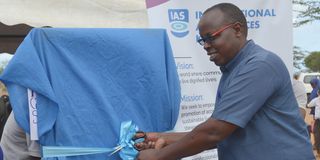Tana River schools to be made disability-friendly

For children living with disabilities in Tana River County, access to social amenities has been difficult for many years.
In most cases, parents have had to hire caretakers or pay extra money for their children to be assisted with various activities in public schools.
Those who can afford it have enrolled their children in special-needs schools outside the county.
The children of parents who cannot afford these costs sometimes drop out of school and stay at home.
“My child quit attending school for two years because she was embarrassed when her peers would laugh at her whenever she sought to go to the latrines they share,” recounts Halima Hussein.
Ms Hussein's daughter uses a wheelchair and getting access to classrooms and toilets is usually a traumatising task.
She said her daughter would at times relieve herself where she was seated.
“She would ask me to dress her in diapers so that she does not have to be a bother to people, and developed a way to dispose of it,” she narrated
Nevertheless, it affected her psychologically and led to poor grades in class, as she felt unwanted.
Ms Hussein said some teachers advised her to take the child to a special-needs school, but she declined as she wanted her child to learn in an environment with normal people and challenge them in their space.
“My child would not live with people with disabilities all her life as after school, there is life out here that treats them all equally,” she said.
But pupils like Ms Hussein’s daughter will now be beneficiaries of a project to construct disability-friendly infrastructure in schools across Tan River County.
International Aid Services (IAS) in partnership with the national government will set up the infrastructure.
The project worth Sh36 million includes training teachers in public schools with normal children on how to handle learners with special needs.
The training will include benchmarking visits to the Kenya Institute of Special Education (KISE).
IAS Kenya official Mary Githiomi said the project seeks to influence national policy on inclusion and empower civil society groups to continue lobbying even when IAS funding ends.
Ms Githiomi said the idea was inspired by the struggles of disabled children to access education in a normal environment like other children.
“When we did the baseline research, we realised there are so many children with special needs not able to access education because the community takes it as a curse if a family has a child with special needs,” she said.
The 10-year programme, she said, is part of a bigger approach for inclusive education in Kenya, Sudan, South Sudan and Tanzania.
In Tana River County, six schools have been upgraded with disability-friendly infrastructure over the past four years.
“There is a huge gap in infrastructure development for such children, hence the focus,” noted Ms Githiomi.
IAS has trained more than 2,000 people on the integration of children with special needs in the Tana River community and targets 20,000 people by the end of the project.
The organisation has also funded 80 families with such children to start income-generating activities by giving them Galla goats.
Tana River Assistant County Commissioner Joshua Langat urged contractors building school infrastructure to factor in disability-friendly designs.
“We must be sensitive to people with special needs in our profession. We can’t continue to ignore them as they are important like any other person,” he said.
Mr Langat appealed to the Ministry of Education to ensure all teachers undergo training on how to attend to children with special needs.
He urged parents to enrol their children with special needs in school, noting that they would get full support to realise their potential in life.





